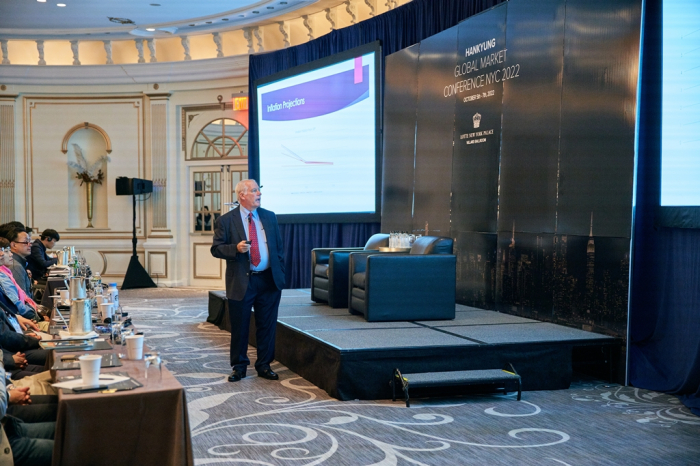Central bank
Fed may allow recession to stem inflation: Ex-Boston Fed chief
Rosengren says US unemployment rate needs to rise above 5% to bring inflation down to the Fed’s 2% target
By Oct 07, 2022 (Gmt+09:00)
3
Min read
Most Read
LG Chem to sell water filter business to Glenwood PE for $692 million


KT&G eyes overseas M&A after rejecting activist fund's offer


Mirae Asset to be named Korea Post’s core real estate fund operator


StockX in merger talks with Naver’s online reseller Kream


Meritz backs half of ex-manager’s $210 mn hedge fund



NEW YORK -- The Federal Reserve will not be able to stem rampant inflation in the US without an economic recession, former Boston Fed President Eric Rosengren said on Thursday, indicating the US central bank may allow the unemployment rate to rise to meet its 2% inflation target.
Rosengren, who served as a participant and voting member of the Federal Open Market Committee from 2007 to 2021, expected the Fed to raise its benchmark interest rate by 125 basis points (bps) more this year – 75 bps in November and 50 bps the following month. He also said the risks are on the upside for higher rates in December as the inflation numbers are unlikely to come in as well as they're hoping.
The US central bank has raised its federal funds rate to 3.00-3.25% so far this year from almost zero at the beginning of 2022 to stabilize consumer prices in the world’s top economy.
“It's not going to be that easy to get inflation back down to 2%,” Rosengren said at the Hankyung Global Market Conference NYC 2022, hosted by The Korea Economic Daily in New York.
He stressed inflation is likely to start easing only when an unemployment rate rises above 5% from the current level of around 3%. He expected a mild recession, with unemployment over 5% providing the slack necessary to return to 2% inflation over the next three years.
“I expect progress on inflation will require a mild recession in the United States,” Rosengren said. “The FOMC has not been successful at soft landings. (But it) doesn’t mean it’s impossible. We may be lucky this time.”
LOOSER LABOR MARKET NEEDED
Rosengren said the Fed policymakers agreed on the need to cool down the labor market.
“While the Fed would never explicitly say it's trying to slow down the labor market and make the unemployment rate go up, but that, in effect, is the only way that you're going to quickly get inflation over a two- or three-year horizon back to 2%.”
The Fed raised its median unemployment rate forecast for 2023 to 4.4% from 3.9% last month, but that would not be high enough to stabilize inflation, Rosengren said.
“I think it's very unlikely that an unemployment rate that low will generate an inflation drop that quick,” he said, adding the rate should rise above 5% to help the Fed achieve the inflation target of 2%.
The US labor market has not been affected much so far this year despite the Fed’s aggressive interest rate hikes.
The Fed’s sustained hawkish stance is increasing downside risks to the economy, Rosengren said. Last month, Fed policymakers signaled the intention of continuing to hike until the funds level hits terminal rates of 4.4% in 2022 and 4.6% in 2023, respectively, much higher than 3.4% and 3.8% in June.
“The faster you have to be raising rates the more risk you're taking. That monetary policy works with long lags,” Rosengren said adding he saw downside risks to the economy and upside risks to interest rates.
EUROPE WILL NOT AVOID RECESSION
The Fed’s aggressive interest rate hikes and the dollar’s strength are putting pressure on other economies, Rosengren said.
“Rapidly rising rates and dollar appreciation are going to put stress. And some of the stress is going to be on Asia.”
He expected Europe to suffer more, saying “in particular, I don't see any way for Europe to avoid a recession.”
“Certainly, having an inflation rate that is forcing the ECB and the Bank of England to raise rates at the same time is going to create a dynamic that makes it very difficult for them to avoid a recession.”
“The oil shock that they're encountering is really severe. Even without the inflation problem, they were probably going to be going into recession this winter anyway.”
Write to Jae-Kil Cho and Sang-Mi An at road@hankyung.com
Jongwoo Cheon edited this article.
More to Read
-
 Central bankBOK chief signals another big step as Fed hike haunts won
Central bankBOK chief signals another big step as Fed hike haunts wonSep 22, 2022 (Gmt+09:00)
5 Min read
Comment 0
LOG IN


